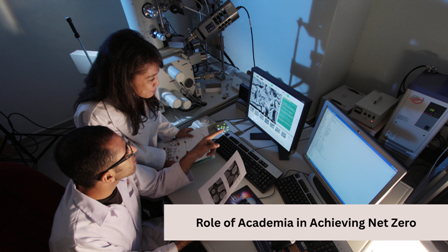The Role of Academia in Achieving Net Zero Goals: A Renewable Lab Perspective
The global race toward net zero emissions is not a
choice anymore—it is a necessity. Countries are setting aggressive
decarbonization targets, industries are rethinking supply chains, and energy
systems are shifting from fossil-fueled to clean and distributed. But this
transition cannot succeed without one critical driver: education.
Academic institutions—universities, engineering
colleges, polytechnics, and technical training centers—must play a lead role
in this transformation. And the most impactful way they can do so is by turning
theory into action through well-equipped renewable energy laboratories.
From training the next generation of green engineers to
fostering clean tech innovation, the role of academia is not only to
educate—but to lead by example. In this blog, we explore how renewable
energy labs act as a bridge between academic learning and real-world impact in
the journey toward net zero.
What Is the Net Zero Imperative?
The goal of achieving net zero emissions means
balancing the amount of greenhouse gases emitted with the amount removed from
the atmosphere. Most nations—including India—have committed to reaching net
zero between 2040 and 2070.
This calls for a massive transformation in:
- Energy
generation (solar, wind, hydrogen, bioenergy)
- Transportation
(EVs, fuel cells, public transit)
- Industry
(energy efficiency, low-carbon manufacturing)
- Buildings
(green construction, smart HVAC)
- Agriculture
(decarbonized inputs, renewable-powered irrigation)
But technology alone won’t make it happen. We need millions
of people trained to install, operate, maintain, and improve these systems.
This is where academia holds the key.
Why Academia Is Critical to the Net Zero Transition
Academic institutions are more than centers of
knowledge—they are ecosystems of talent creation, innovation, and thought
leadership. Their influence on net zero progress spans several key areas:
1. Creating a Skilled Green Workforce
Every net zero strategy needs engineers, researchers, and
technicians who are job-ready in solar PV, wind energy, hydrogen production, EV
integration, and energy storage. Academia is the engine that powers this
workforce.
2. Enabling Applied Research and Innovation
With access to labs and pilot-scale systems, universities
can test new materials, control strategies, and integration techniques. This
applied R&D supports industries and startups working at the forefront of
clean tech.
3. Raising Awareness and Climate Literacy
Students across disciplines—engineering, economics,
architecture, agriculture—must understand how their work ties into
sustainability. A lab environment helps translate abstract concepts into
visible impact.
4. Demonstrating On-Campus Decarbonization
When institutions set up renewable microgrids, EV labs, or
green hydrogen demonstrators on campus, they don’t just teach—they lead by
example and build public confidence in the transition.
The Renewable Lab: Where Net Zero Learning Comes Alive
A Renewable Energy Lab is not just a collection of
kits—it’s a real-world simulation space where students can experiment
with the technologies driving the net zero transition.
Key systems typically found in a renewable lab:
- Solar
PV Training System: Study panel orientation, I-V curves, and MPPT
control
- Wind
Energy Setup: Observe blade pitch impact, turbine RPM, and power
output
- Battery
Storage & BMS Trainer: Analyze charge/discharge, SoC, and aging
effects
- Grid-Tied
Inverter Bench: Explore synchronization, THD, and smart grid features
- Green
Hydrogen Lab: Demonstrate electrolysis, gas storage, and fuel cell
electricity
- Microgrid
Simulator: Test energy flow, load balancing, and fault recovery in
hybrid systems
- Data
Analytics Platform: Collect, log, and visualize energy performance
metrics
These labs provide a safe, scalable, and modular
environment where students don’t just learn what renewable energy is—they test
it, optimize it, and innovate with it.
How Ecosense Labs Contribute to Net Zero Education
At Ecosense, we design renewable energy labs that are
aligned with academic goals and industry demands. Our systems are built
for education, research, and outreach, helping institutions fulfill their role
in the climate transition.
Ecosense labs support:
- Undergraduate
learning through interactive, curriculum-aligned experiments
- Postgraduate
and PhD research in solar MPPT, battery life modeling, fuel cell
performance, and more
- Faculty
development with modular systems for publication and grant-based
projects
- Industry
partnerships by enabling component testing, prototyping, and student
internships
- Skill-based
training under NSDC, AICTE-IDEAL, and other government schemes
By enabling students to experiment with actual renewable
systems, our labs empower them with both the knowledge and the confidence
to work in green careers.
From Campus to Community: Academia’s Wider Impact
Academic institutions can use their renewable labs to extend
their reach beyond students:
- Host
workshops and awareness programs for schools, communities, and
industry professionals
- Support
startups in testing and developing clean energy solutions
- Partner
with utilities or government bodies for grid integration studies or
smart city planning
- Offer
certification programs in solar installation, energy audits, hydrogen
safety, and more
In doing so, institutions position themselves as regional
leaders in climate action, not just education providers.
Driving Policy, Innovation, and Impact
Through publications, policy white papers, and prototype
demonstrations, academia also helps shape national clean energy strategies.
Many net zero targets rely on academic validation of emissions reduction
pathways, technology readiness, and grid integration models.
Renewable labs provide the data, evidence, and test
environments needed to:
- Evaluate
new technologies under Indian conditions
- Build
robust business models for local deployment
- Advise
on regulations, standards, and training frameworks
The Net Zero Mission Starts in the Lab
The road to net zero will be long, challenging, and full of
innovation. And it begins in classrooms, corridors, and labs of academic
institutions that understand their unique power to create change.
Renewable energy labs are more than teaching tools—they are living
ecosystems of experimentation, upskilling, and innovation. By investing in
these labs, academia not only supports the net zero mission—it helps lead it.
At Ecosense, we are proud to partner with
institutions across India and beyond to set up renewable labs that don’t just
teach students—they shape a sustainable future.
Let’s work together to empower education—and achieve net
zero, one lab at a time.

